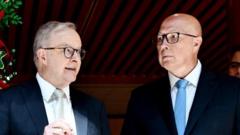In a pivotal moment leading up to the federal election on May 3, Australian Prime Minister Anthony Albanese and his rival Peter Dutton faced off in their inaugural debate. The contest, organized by Sky News and The Daily Telegraph, saw each leader fielding questions on pressing national concerns, particularly the rising cost of living—a topic that resonated widely with undecided voters in attendance.
Polls suggest a tightly contested election ahead, raising the likelihood that either party could end up in coalition with independent candidates or minor parties. According to Sky News, Albanese was declared the winner of the debate after a vote conducted amongst the 100 undecided voters.
During the debate, a significant moment arose when the audience was asked if they were struggling with current living costs; a vast majority raised their hands in response. Dutton called this "a very confronting scene," while Albanese asserted that his administration had made progress by lowering inflation and increasing wages and suggested that interest rates were on the decline.
Policymaking discussions included a potential cut in the fuel excise tax and the escalating costs associated with healthcare visits, particularly seeing a general practitioner. When questioned about US President Donald Trump's tariffs, Albanese confidently stated, "no country is better prepared" than Australia for such negotiations. He emphasized Australia’s zero-tariff stance on US goods as a point of advantage.
Dutton, on the other hand, referenced his prior experiences negotiating with the Trump administration, articulating the need for strong leadership capable of standing up to international pressures.
As both leaders laid out their visions for Australia's future, viewers were left to ponder how their next prime minister would emerge from this contentious and closely watched election campaign.
Polls suggest a tightly contested election ahead, raising the likelihood that either party could end up in coalition with independent candidates or minor parties. According to Sky News, Albanese was declared the winner of the debate after a vote conducted amongst the 100 undecided voters.
During the debate, a significant moment arose when the audience was asked if they were struggling with current living costs; a vast majority raised their hands in response. Dutton called this "a very confronting scene," while Albanese asserted that his administration had made progress by lowering inflation and increasing wages and suggested that interest rates were on the decline.
Policymaking discussions included a potential cut in the fuel excise tax and the escalating costs associated with healthcare visits, particularly seeing a general practitioner. When questioned about US President Donald Trump's tariffs, Albanese confidently stated, "no country is better prepared" than Australia for such negotiations. He emphasized Australia’s zero-tariff stance on US goods as a point of advantage.
Dutton, on the other hand, referenced his prior experiences negotiating with the Trump administration, articulating the need for strong leadership capable of standing up to international pressures.
As both leaders laid out their visions for Australia's future, viewers were left to ponder how their next prime minister would emerge from this contentious and closely watched election campaign.

















